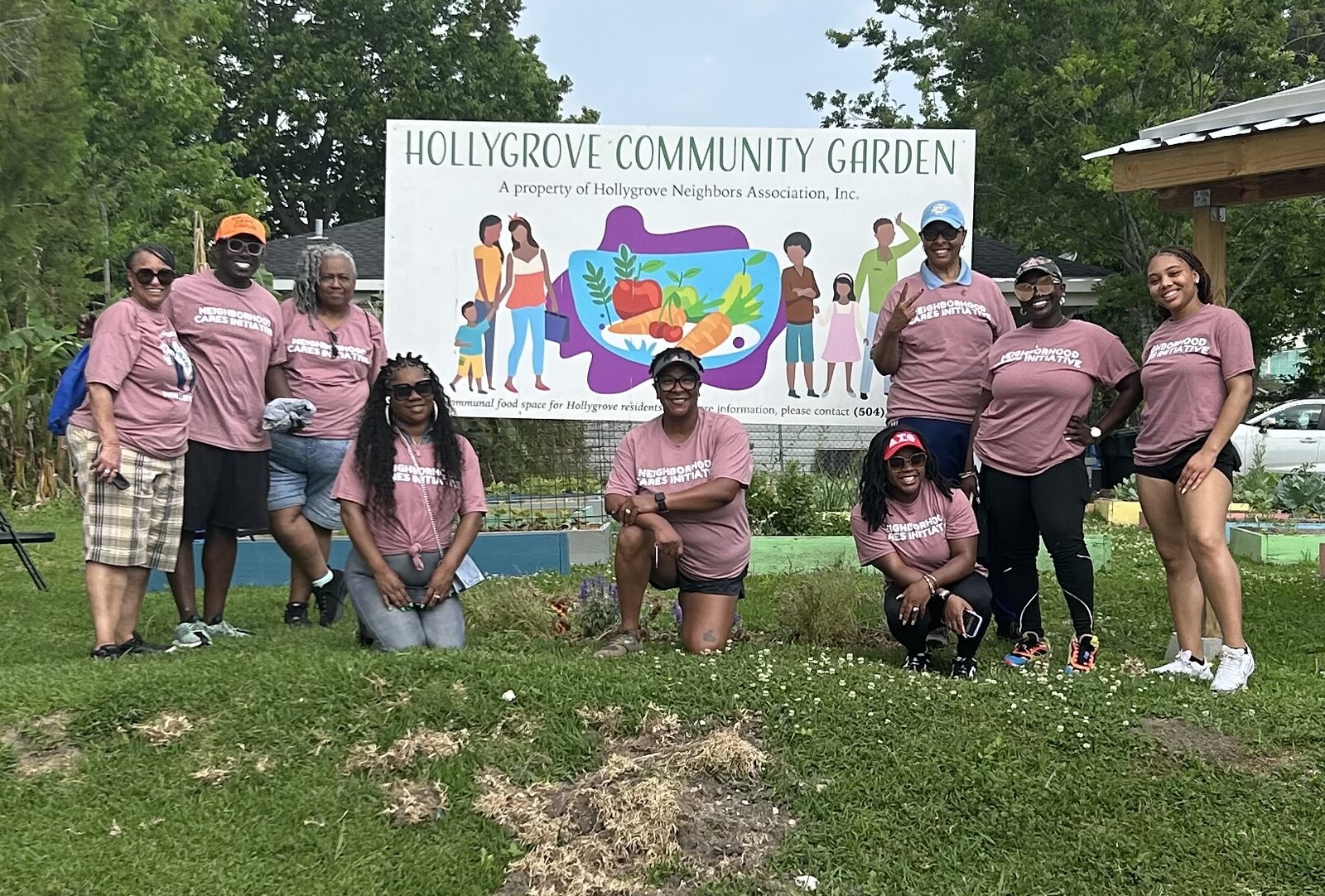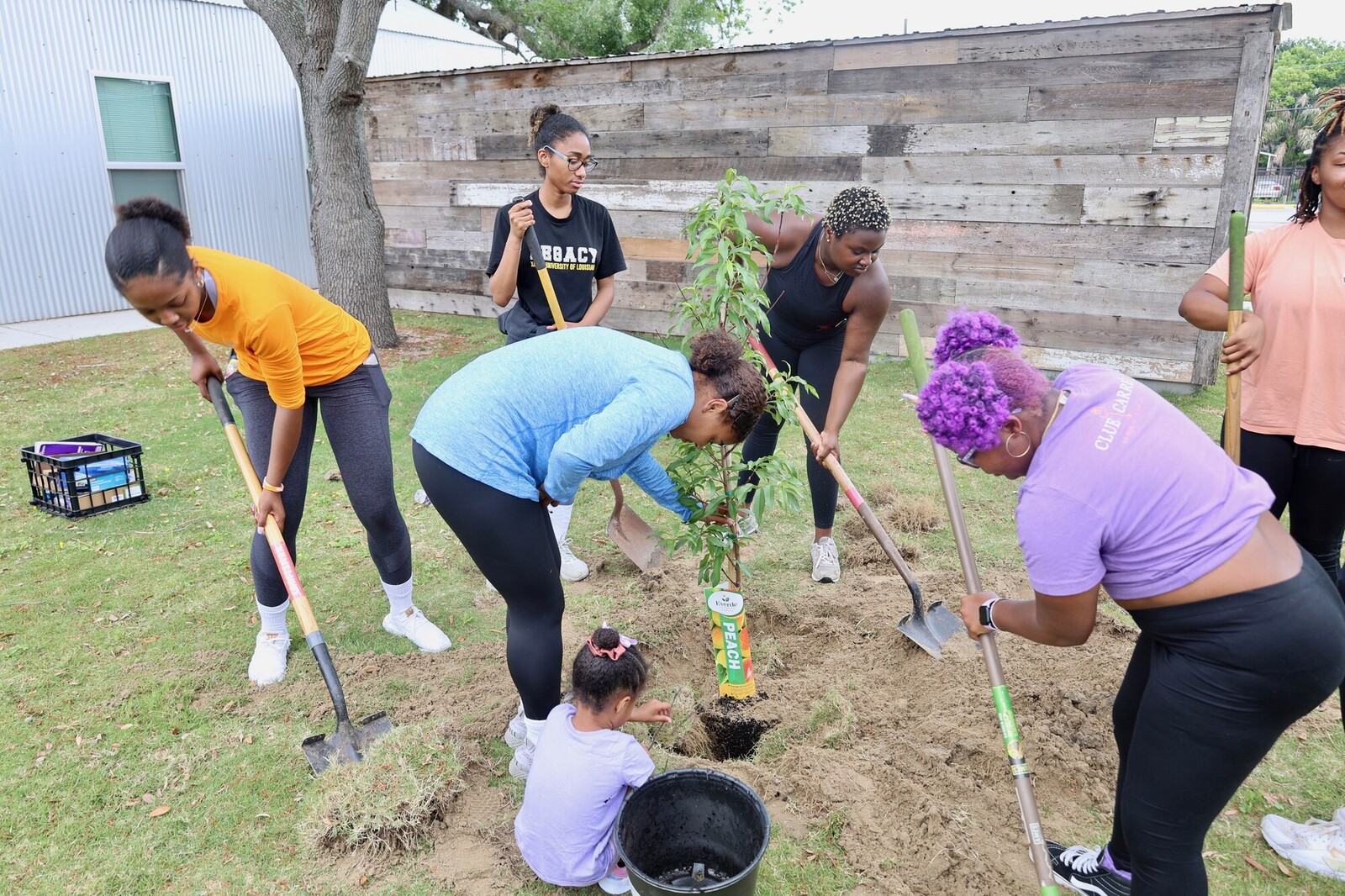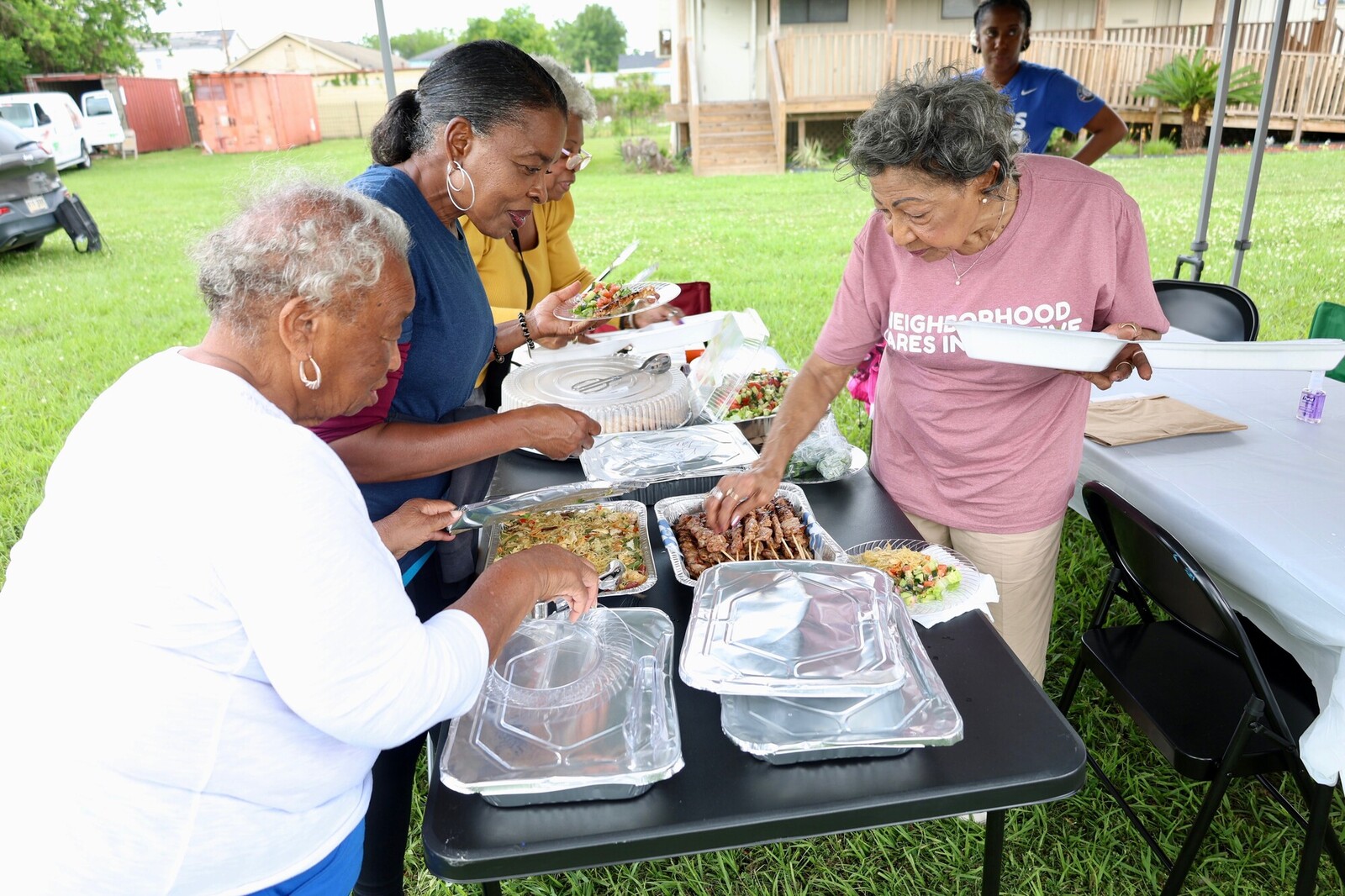
AFSC staff, Hollygrove community members, and volunteers. Photo: Peter Nakhid
In the Hollygrove neighborhood of New Orleans, residents are working together to build a stronger, more resilient community where everyone has the resources they need to thrive. Since 2016, AFSC’s Peace by Piece program has supported their efforts through our Sustainable Communities Project. The project is currently managing or building five community gardens in the neighborhood. We’re growing greens, cantaloupe, tomatoes, sweet potatoes, and other fruits and vegetables throughout the year.
Our collective efforts go beyond producing food. We are working to build a self-determined community that controls the distribution of its resources and creates an economy that responds to the needs of its people as well as the planet. Our Sustainable Communities Project aims to promote healthy food access and increase food security in a parish where more than 62,000 people face food insecurity. Together, we are developing pathways to land and food access for all residents by amplifying the voices of community members and generating alternative systems of economic and community growth.
Green initiatives in action
One example of our efforts is our Growing Green events. They bring together Hollygrove residents, university students, and other community members to support the neighborhood’s sustainability initiatives.
Our most recent Growing Green event took place in April, just before Earth Day. It was also part of the Hollygrove Cares Community Day, an initiative sponsored by the City of New Orleans Neighborhood Engagement Office. The day included a community-wide clean-up and beautification project with more than 80 volunteers, city officials (including the mayor), city agencies, and a resource fair for Hollygrove residents. Hollygrove Neighbors and Peace by Piece participated by welcoming everyone, tabling, and working with volunteers at one of the garden properties to paint newly built garden boxes.
Next, Xavier University students planted fruit trees on the properties of local homes and an apartment community, including citrus, peach, satsuma, and blackberry. We also donated and planted the remaining trees that were living in the greenhouse to neighbors.

Planting trees in Hollygrove. Photo: Peter Nakhid
Planting trees is critical in cities like New Orleans, which is ranked #1 for the worst urban heat island effect in the U.S., according to the New Orleans Reforestation Plan. Urban heat islands are metropolitan areas where buildings and pavement cause the city to be hotter than outlying areas. One reason for New Orleans’ ranking is because of the city’s low tree canopy, which is less than 20% coverage. That’s compared to Memphis, Tennessee and Atlanta, Georgia, which have coverage of 37% and 47%, respectively. During Hurricane Katrina in 2005, more than 200,000 trees in New Orleans were lost, according to the report. Nearly 20 years later, the canopy still hasn’t recovered.
By planting trees, community members and volunteers demonstrate the principles of environmental conservation, community engagement, and sustainability. We’re upholding our collective responsibility to protect and preserve the Earth for current and future generations.
Nourishing mind and body
To conclude our Growing Green event last month, we hosted the Community Kitchen. Kitchens are sacred places. Traditionally, it’s where food is prepared to fuel our bodies. Whether there is a single set of hands—or several sets—preparing meals, the kitchen is where history is passed down among families. Lessons are exchanged about preparing and cooking food that has nutritional value and cultural significance. The kitchen is also where people work in sync to curate meals presented with love.
The Community Kitchen shares in this tradition using food and political education to provide nourishment for the community’s collective mind, body, and soul. It consists of a series of meals and conversations with Hollygrove residents about issues related to climate, food, and the economy. Together, we explore collective strategies to address concerns using the neighborhood’s assets to engage and mobilize neighbors to action. And we work together to implement community actions that promote climate resilience, food access, and economic development in Hollygrove.
Last month, we were fortunate to host our spring Community Kitchen on the lawn of St. Peter A.M.E. Church. This is where we are currently building a new garden that we hope to complete before the end of the summer. Community Kitchen meals are typically prepared by a community member. We made the decision to have this one catered because several of us were working at all of the events of the day. Filipino food was prepared by a local pop-up caterer, Marlon Green, owner of Barbekyu NOLA. As community members enjoyed the food, we discussed land acquisition and community land trusts—where land is owned and governed by residents themselves.

Community members sample Filipino food as part of a Community Kitchen event. Photo: Peter Nakhid
“The Kitchen is a positive learning experience about making community better,” said Elizabeth Boone, a longtime resident born and raised in Hollygrove who participates in all of the garden initiatives. “The discussions we have about neighborhood composting, solar panel fields, healthy land use and community land trusts help me to realize that the possibilities for what we can achieve for our community are endless. I’ve learned so much about the medicinal use of plants, tree planting, growing and harvesting produce that I’ve been inspired to grow my own fruits and vegetables. I love the community that we are building. This was a great day of care for my community and the planet.”
Over the past eight years, so much has grown from the Sustainable Communities Project and the neighborhood’s green initiatives. That includes a meaningful acknowledgment of our responsibility to the planet and each other. In addition to the Community Kitchen and tree planting, we host monthly workshops, hold garden service days, operate a solar-powered community fridge, and distribute food shares to nourish residents, strengthen community, and promote a healthy planet.
Empowered communities advocate for their rights to a healthy environment. Self-determined communities are best positioned to identify and implement solutions to environmental justice issues that are tailored to their specific needs and circumstances. Resilient communities foster social cohesion, solidarity, and mutual support networks so they can better withstand and recover from environmental shocks and stressors. This is what we are working to build every day in Hollygrove.
